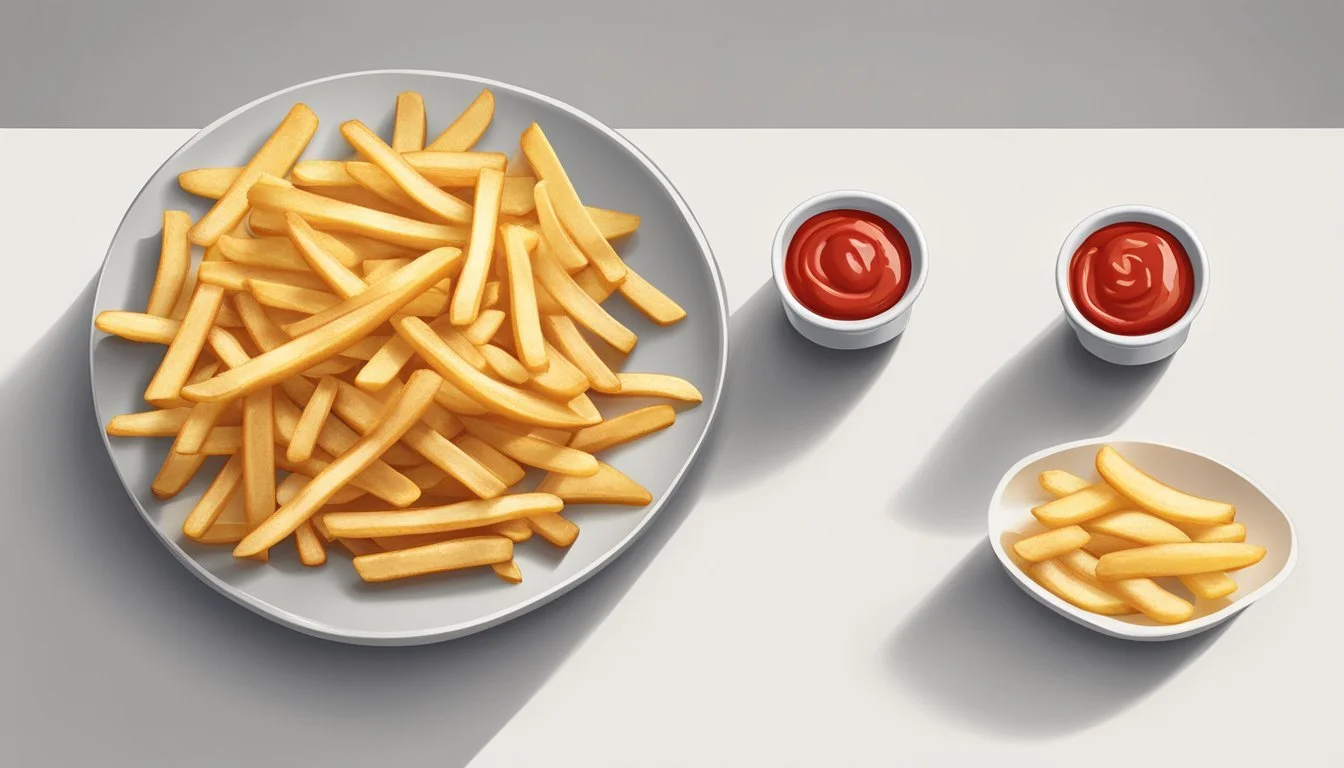Are French Fries Gluten-Free?
Unveiling the Truth about This Popular Snack
When considering whether french fries are gluten-free, the primary focus should be on both the cooking process and the ingredients used. Potatoes in their natural state are gluten-free, making them an ideal food for individuals managing celiac disease or gluten sensitivity. However, the preparation of french fries in restaurants or pre-packaged varieties for home cooking often introduces variables that can affect their gluten status.
In many fast-food and sit-down restaurants, french fries ar frequently cooked in fryers that are shared with gluten-containing foods. This common practice leads to cross-contamination, rendering the fries unsafe for people with celiac disease or gluten sensitivity. Moreover, certain french fries may be coated with flours or seasonings that contain gluten, or in some cases, batter that includes wheat-based substances such as beer.
A noteworthy consideration is that some establishments, recognizing the dietary needs of their customers, offer gluten-free french fries cooked in dedicated fryers with safe oils. These restaurants take cross-contamination seriously and cater to those requiring a gluten-free diet, ensuring that people with gluten-related disorders can still enjoy french fries without worry. However, it is crucial for diners to verify the gluten-free status of french fries with each establishment, as practices and ingredients can vary widely.
Understanding Gluten
In discussing gluten and its relevance to foods such as French fries, one must recognize gluten as a protein present in certain grains. The inclusion or absence of gluten determines whether a food product is suitable for those with gluten sensitivities.
What Is Gluten?
Gluten is a protein found mainly in wheat, barley, and rye. It acts as a binding agent, giving dough its elasticity and allowing bread to rise during baking. Its viscoelastic properties are essential for the texture and structure of many baked goods and food products. For individuals with celiac disease or gluten sensitivity, ingestion of gluten can cause adverse health effects.
Sources of Gluten
Common sources of gluten include:
Wheat: Includes varieties like durum, spelt, farro, and others.
Barley: Used in malt, food coloring, soups, and beverages.
Rye: Typically found in rye bread, rye beer, and some cereals.
Here is a list of common food items that contain gluten:
Breads and pastries
Pasta and cereals
Crackers and baked goods
Beer and malt beverages
Certain sauces and gravies
It is crucial for anyone with a gluten-related disorder to check food labels and be aware of cross-contamination, as gluten can be present in foods not typically associated with wheat, barley, or rye.
Gluten-Free Diet Basics
A gluten-free diet excludes all forms of gluten, a protein found in wheat, barley, rye, and triticale. It's a necessary lifestyle for individuals with celiac disease, gluten sensitivity, or gluten-related allergies.
Benefits of a Gluten-Free Diet
For those with celiac disease, adhering to a gluten-free diet is essential for their health and well-being. Eliminating gluten prevents damage to the lining of the small intestine, thereby avoiding symptoms such as abdominal pain, bloating, and diarrhea. Additionally, individuals who have non-celiac gluten sensitivity may also experience significant relief from gastrointestinal discomfort and improved health when following a gluten-free diet.
Health Benefits for Celiac Disease Sufferers:
Prevents small intestine damage
Reduces symptoms like diarrhea and bloating
Improvements for Gluten Sensitivity:
Alleviates gastrointestinal discomfort
Enhances overall well-being
Challenges of Eating Gluten-Free
While the benefits of a gluten-free diet for certain individuals are clear, there are challenges that come with this dietary change. Finding purely gluten-free foods can be difficult due to cross-contamination risks. Even foods naturally free of gluten, such as potatoes, can become contaminated when prepared in a facility that also processes gluten-containing foods or shared fryers.
Cross-Contamination Risks:
Shared cooking surfaces
Foods processed in facilities with gluten-containing items
Labeling Inconsistencies:
Not all foods labeled "gluten-free" are 100% free from cross-contamination
Some products may have traces of gluten despite gluten-free labeling
Maintaining a gluten-free diet requires constant vigilance, education, and often a higher financial cost due to the pricing of specialized gluten-free products. Individuals must read labels carefully, inquire about food preparation in restaurants, and possibly avoid certain fast foods and processed items to adhere strictly to their dietary needs.
French Fries and Gluten
When assessing whether French fries are gluten-free, it is crucial to consider both the innate properties of potatoes and the potential cross-contact with gluten during the cooking process.
Are Potatoes Gluten-Free?
Potatoes themselves are naturally gluten-free. As tubers, they do not contain gluten, which is a type of protein found in wheat, barley, and rye. People following a gluten-free diet can safely consume potatoes in their pure form.
Common Ingredients in French Fries
French fries, at their most basic, consist of potatoes and cooking oil. However, many variations exist, with additional ingredients that could contain gluten:
Batter: A flour-based coating used to achieve a crispy texture.
Breading: A seasoned flour or breadcrumb coating applied before frying.
Seasonings: Some seasonings and additives may include gluten or wheat flour as a binding agent.
A key point to remember is that even if french fries are made from gluten-free ingredients, they can still be subject to cross-contamination during preparation. This commonly occurs if the fries are cooked in the same oil as gluten-containing foods, or if utensils and surfaces that have touched gluten are used. It's important to verify that the cooking environment is dedicated to gluten-free preparation to assure the fries remain uncontaminated.
Cross-Contamination Risks
When discussing whether French fries are gluten-free, the consideration of cross-contamination becomes particularly important. Understanding the dynamics of cross-contamination is essential for individuals with gluten sensitivities or celiac disease to avoid accidental ingestion of gluten.
Understanding Cross-Contamination
Cross-contamination occurs when gluten-free foods come into contact with gluten-containing substances. This contact can transfer gluten proteins to otherwise safe foods, making them harmful to individuals with celiac disease or gluten intolerance. Entities involved in cross-contamination risks include utensils, surfaces, and cookware that have not been properly cleaned after being used with gluten-containing foods.
Shared Fryers and Contamination
Shared fryers pose a significant risk of cross-contamination for gluten-free foods. When French fries are cooked in fryers that are also used for breaded products containing wheat, the oil and fryer can retain gluten particles. A study found that 9 out of 20 orders of French fries cooked in shared fryers had detectable levels of gluten, which presents a tangible risk for gluten-sensitive individuals.
Fryer Type Contamination Risk Dedicated fryer Low Risk Shared fryer High Risk
Using a dedicated fryer that is only used for gluten-free foods can mitigate the risk of cross-contamination. Some restaurants ensure the safety of gluten-free options by using separate fryers for their French fries. However, not all establishments have dedicated gluten-free fryers, making it important for consumers to inquire about cooking practices before consuming fries at a fast-food or dining establishment.
Restaurant Considerations
When dining out, individuals seeking gluten-free options face unique challenges. They must be vigilant about cross-contamination and ingredient transparency, particularly when ordering French fries, which can vary widely in their gluten-free status.
Ordering French Fries at Restaurants
When visiting restaurants, it is critical to inquire about the preparation process of French fries. Cross-contamination is a common concern, as fries are often cooked in the same oil as breaded items containing gluten. Patrons should ask whether the French fries are cooked in a dedicated fryer and if the establishment uses separate utensils and surfaces to minimize the risk of gluten exposure. For example, Red Robin is known for offering gluten-free fries prepared with such attention to cross-contamination concerns.
Fast Food and Gluten-Free Options
Many fast food restaurants have begun to cater to gluten-free diets, but their protocols for preventing cross-contamination can vary. In-N-Out Burger and Larkburger, for instance, cook their fries in dedicated gluten-free fryers using sunflower oil. However, popular chains like McDonald's and Burger King may have differing policies and practices. Customers should not assume that all fast food French fries are gluten-free; they must conduct due diligence and confirm each restaurant's specific processes. Some fast food locations are transparent about their efforts to prevent gluten cross-contamination, and this information is often available on their websites or upon direct inquiry.
Identifying Gluten-Free Fries
When seeking gluten-free french fries, consumers must examine both labeling and certification, as these factors directly indicate whether the fries meet gluten-free standards. It's vital to understand that fries can be contaminated with gluten during processing or cooking, even if the primary ingredients are gluten-free.
Labeling and Allergen Information
Consumers should look for allergen information that indicates whether a product contains wheat or gluten-containing ingredients. Labels are their first line of defense; these should not only list ingredients but also highlight potential allergens. Gluten-free labeling on a package is a clear sign that the product is suitable for those with gluten sensitivities or celiac disease. However, caution is advised as some fries may be labeled as "gluten-free" but still share processing facilities with gluten-containing products. Leading brands like Ore-Ida and Alexia offer a variety of frozen french fries that are labeled gluten-free, while others like McCain advertise some gluten-free options, though cross-contamination in shared facilities is possible.
While shopping, consumers should note that products with a gluten-free label have met stringent FDA guidelines which require gluten levels to be below 20 parts per million. However, it's equally important to check if the label indicates that the fries are made in a facility that also processes wheat, as this can increase the risk of cross-contamination.
Certified Gluten-Free Brands
For an additional layer of assurance, individuals can seek out certified gluten-free brands. Certification programs involve independent testing and verification processes to ensure products meet strict gluten-free standards.
Certified gluten-free brands are likely to have undergone more rigorous testing than those simply labeled gluten-free. These certifications are often displayed prominently on the front packaging of the product. Consumers can find certified gluten-free french fries in the frozen section of many grocery stores.
When in doubt, customers are encouraged to contact the brand directly to inquire about their manufacturing processes and cross-contamination protocols to ensure the fries they choose are safe for their dietary needs.
Safe Preparation at Home
When preparing gluten-free French fries at home, it's crucial to consider the cooking methods and kitchen practices to avoid gluten contamination. The right techniques ensure that individuals with gluten sensitivities can enjoy French fries without concerns.
Cooking Methods
Oven: An oven is a safe option for preparing gluten-free French fries at home. By spreading the fries out on a baking sheet and cooking at a high temperature, they can become crispy without the risk of cross-contamination from a shared fryer.
Deep Fryer: Those with a dedicated deep fryer at home have the advantage of being able to control what goes into it. Using an oil that has not been used to cook gluten-containing items is vital. Always check the ingredient labels on frozen French fries to confirm that they are gluten-free before frying.
Avoiding Cross-Contamination in the Kitchen
Utensils and Surfaces: Ensure all utensils, cutting boards, and surfaces are thoroughly cleaned before use. Gluten can linger on these items, so it's important they have not been in contact with gluten-containing foods.
Fryer Use: If using a deep fryer, it should not be one that has previously cooked items that contain gluten. Cross-contamination can easily occur in oil that has been used to prepare gluten-containing products.
By strictly adhering to these methods and precautions, one can confidently prepare gluten-free French fries at home without fear of gluten exposure.
Exploring French Fry Variations
The diverse world of french fries offers a range from traditional potato-based fries to alternative ingredients and flavorings. As consumers explore gluten-free options, understanding the variations in french fry styles becomes increasingly important.
From Sweet Potato to Seasoned Fries
Sweet potato fries are a popular gluten-free alternative to traditional fries, as sweet potatoes are naturally gluten-free. However, their gluten-free status can be compromised by the addition of coatings or seasonings that may contain gluten. It’s essential for consumers to verify whether sweet potato fries are prepared and cooked in a gluten-free environment.
Seasoned fries often come with various herbs and spices that enhance their flavor. Seasoned fries can be gluten-free, but the mix may include additives with gluten, such as wheat flour, to improve crispiness. Restaurants that offer gluten-free seasoned fries typically ensure that the seasoning blends are free of gluten-containing ingredients.
Unique French Fry Styles
There are several unique fry cuts and styles that cater to different preferences and dietary needs:
Waffle fries: These are characterized by their crisscross pattern and often provide a larger surface area for seasonings and dips. As with other styles, their gluten-free status depends on the ingredients used and cross-contamination risks in the kitchen.
Steak fries: These are thicker and often have a softer interior. They are usually made from potatoes and can be gluten-free if no gluten-containing ingredients are added during their preparation.
Tater tots: These bite-sized, grated potato snacks are another form where gluten may be introduced in binders or during the frying process.
For those requiring gluten-free options, it is important to ask about the fryer used for cooking these products as shared fryers with gluten-containing items can lead to cross-contamination.
Common Questions and Concerns
When considering whether French fries are gluten-free, consumers frequently encounter confusion at both fast-food and sit-down restaurants. This section addresses common inquiries and clarifies how to navigate menus to make safe choices for those adhering to a gluten-free diet.
Navigating Fast-Food Menus
At fast-food restaurants, the gluten-free status of French fries can vary significantly. Some chains, such as In-N-Out Burger, fry their potatoes in a dedicated fryer using sunflower oil, ensuring no cross-contamination with gluten-containing products. However, others may use shared fryers, which can lead to gluten transfer from breaded items to fries. Patrons should not assume fries are gluten-free and always inquire about the preparation method and fryer use.
Example of gluten-free fry options at fast-food chains:
In-N-Out Burger: Dedicated gluten-free fryer with sunflower oil.
Larkburger: Offers gluten-free fries and onion rings.
Lion's Choice: Gluten-free burgers and fries with a dedicated fryer.
Understanding Restaurant Menus
At sit-down restaurants, patrons should exercise caution and ask specific questions about how the fries are prepared. A key concern is whether the fries are made in a shared facility or fryer, posing a risk of gluten contamination. Additionally, suppliers of frozen fries may not guarantee a gluten-free product if they process other gluten-containing items. Diners should pay close attention to whether fries are beer-battered or seasoned with ingredients that might contain gluten, and verify with restaurant staff to ensure what they are ordering is, in fact, gluten-free.
Considerations when assessing restaurant fries:
Always verify if the fryer is shared with gluten-containing foods.
Check if the fries have any gluten-containing coatings or seasonings.
Confirm the fries' gluten-free status with the restaurant staff.
Menu labeling and staff training vary by restaurant, so diners must be proactive in acquiring accurate information about the gluten-free status of fries.






